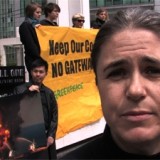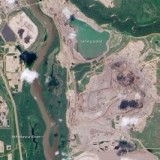Article by Mike de Souza for Canwest News Service. “Federal politicians from the government and opposition benches have mysteriously cancelled an 18-month investigation into oilsands pollution in water and opted to destroy draft copies of their final report.” Read article
Tag Archives: Alberta Tar Sands
Big Jump in Oil Tankers in Vancouver’s Port

Canadians Say No to Enbridge Pipeline and Tankers
Greenpeace Canada and other environmental groups and citizens gathered outside the regional office of Enbridge in downtown Vancouver to say no to the company’s proposal to pump bitumen from the Tar Sands across BC and into coastal supertankers in the Great Bear Rainforest.
The demonstration was staged in conjunction with a similar one in Calgary outside Enbridge’s Annual General Meeting today. Concerns over the company’s BC proposal have been heightened by the recent environmental catastrophe in the Gulf of Mexico that has seen millions of gallons of oil pollute the marine environment and threaten coastal communities, fish, and wildlife.
‘It’s going to be bigger than Clayoquot Sound’
Article by Mark Hume in the March 27, 2010 Globe and Mail about the Great Bear Rainforest and the proposed Enbridge Northern Gateway pipeline. Read article

The tar sands and us
I cannot begin this article without mentioning the great column by Mark Hume
in the BC section of the Globe and Mail for March 27 on the proposed Enbridge
pipeline from the Alberta Tar Sands to the BC coast and thence down the coast
of BC: ‘It’s going to be bigger than Clayoquot Sound’.
The Battles of Battles
I spoke, in my recent column on Fish Lake, of the looming “battle of all battles” coming up on this lake issue but as the man said, “You ain’t seen nothing yet” for this is a multi-faceted fight, a war with plenty of wars within wars.
Here are the combatants: producers in the Alberta Tar Sands, the pipeline company and all they use for the construction, a large number of First Nations, the government of British Columbia, the Government of Canada, the United States (big time) and the Environmental Movement.
What are the Tar Sands?
Here’s the skinny on the Tar Sands: They are located in Northern Alberta, comprised of three major deposits making Canada an oil producing superpower like Saudi Arabia. These projects cover an area larger than England, with proven oil reserves amounting to 175,000,000,000 barrels.
We’re talking heavy, thick oil which requires serious processing before it becomes usable. It’s a dirty, dirty business. In fact, the Alberta tar sands oil holds three or four times the greenhouse gases found in “traditional” crude, making Canada the largest per capita polluter in the world.
Andrew Nikiforuk, a noted writer on energy matters, in an interview with seasoned journalist Charlie Smith of the Georgia Straight had this to say: “the Alberta tar-sands developments is the world’s largest construction project, the world’s largest capital project, and the world’s largest energy project – one that uses as much water in a year as a city with a population of two million”. More in fact than Edmonton and Calgary combined!
Points to ponder
- The Tar Sands produces 40 million tonnes, annually, of greenhouse gas emissions currently; nearly the emissions of the Czech Republic
- Tar sands GHG emissions may double by 2015
- Producing oil from the tar sands releases three to five times more GHG emissions than oil from conventional sources
- Every day the tar sands burn 600 million cubic feet of natural gas to produce tar sands oil, enough natural gas to heat three million Canadian homes
- By 2020 tar sands GHGs will likely increase to 141 million tonnes, double the current emissions of all cars and trucks in Canada
Have we lost our minds?
What madness this all is! Wasn’t the idea that we’d wean ourselves off oil and concentrate our efforts and our money on substitutes? Can’t we see that by extracting oil that can only be viable if the price of oil is near $100 a barrel that we’re in fact making the high price of oil a self-fulfilling prophecy?
Who’s fighting whom?
In this corner we have the producers, the pipeline company, the governments of BC, Alberta, Canada, the United States of America, and more recently China and Korea – plus in all likelihood all the Chambers of Commerce along the way. Opposed are a number of First Nations and various environmental groups.
The governments don’t care
Ottawa, Edmonton and British Columbia will be thick as thieves and all will be
scheming in every way imaginable to get this job done. BC has already consented
to the tanker route so that problem is off the table. It must be borne in mind
that contrary to many assumptions, Canada supplies more oil to the US than does
any other country.
The pipeline is ostensibly being driven by a desire to reach new markets in Asia
as dirty tar sands oil comes under greater scrutiny from US lawmakers and a
public concerned about climate change. While this is true, the American market
for oil is growing – and its reliance on the Middle East is an increasingly
questionable policy. It’s thus fair to assume that some of those new Pacific tankers will be destined for the West Coast of the United Sates.
American politicians will be under enormous voter pressure across party lines because America’s entire economic future depends upon oil and power from Canada – which will put pressure on all three Canadian governments to play ball. In fact – and don’t laugh because it isn’t funny – as the demand for oil and power increases, be it BC energy or Alberta tar sands oil, if it appears that this oil and power is not forthcoming they are not going to let themselves have a massive depression and would threaten, at first behind closed doors and then publicly and meaningfully, to send in the troops. (If you were president of the United States and suddenly saw your economy in grave jeopardy – not a strong enough description – would you stand by and say “well Canada is our friend and as a sovereign nation can do as it pleases even though it beggars its neighbour?”)
The Constitution at rest
Under our constitution, the provinces control natural resources while Ottawa has power over exports backed up with the power of the purse. The Environment is a shared power. I don’t believe for a moment that the three Canadian governments will raise constitutional matters on this issue – from a social point of view (as in all things) Ottawa is too far away to care and for the two provinces, the economy will be all that matters.
They’ll not care that a pipeline goes through highly sensitive areas putting many animals, especially the caribou at risk.
It will not concern them for a nano second that an oil spill on the coast is not a risk, but a certainty; for a “risk” is an event waiting to happen. The question a “risk” raises is not “if” but “when”.
Enter First Nations

As I see it, then, the governments will continue their hypocritical two faced attitude towards the wishes of the people on things like the environment and other social issues.
It gets down, then, to the aboriginal peoples.
Gerald Amos, director of the Coastal First Nations, said recently “Natives have always understood the importance of protecting the environment, but with so many big resource projects proposed in B.C., it’s time to take a harder stand”.
“Perhaps we haven’t been strong enough… from here on out… we are going to be firm,” said Mr. Amos, who lives in Kitimat, near the terminus of Enbridge’s proposed Northern Gateway Pipeline.
Mr. Amos said legal challenges and political pressure will be used to stop the
pipeline, but “if it goes ahead and tankers come through our waters, we are
preparing to put boats right across the channel and stop them… Whatever it takes.
Our position right now is that this project is not going to happen.” [Emphasis mine]
Wet’suwet’en hereditary chief Alphonse Gagnon said “This Energy Summit was a reminder that the tar sands affects us all – from Fort Chipewyan to Haida Gwaii and beyond. We can only protect our lands and waters if we stand together.”
Will money do the trick?
There are two fights as First nations see them – the pipeline itself and the tanker trade down the coast – meaning, to put it bluntly, the governments must come up with a huge and complicated pay-off, if a pay-off will do the trick. Before First Nations people get angry with me, I hope they remember that on fish farms and private energy schemes some tribes have indeed been bought off. (When I say that, I dare not be critical because I’ve never been in the dire economic straits that some bands have been coping with since the European arrived.)
But while Gordon Campbell responded to a recent unified declaration led by BC and Alberta First Nations against the pipeline by touting the jobs it would create, these aboriginal leaders have been quick to address and dismiss that argument. Grand Chief Edward John of the First Nations Summit countered Campbell: “We do need jobs and work for sure in our communities. But…first nations have looked at this very carefully and said the risks outweigh the benefits.”
Conclusion
The long and the short of it is that none of the three governments involved give a fiddler’s fart for social and environmental issues. They look at those who do as simpleminded “lefties” who “are just always against everything”.
The opposition to the pipeline will win or lose based on whether or not the First Nations involved along the pipeline and along the proposed tanker route will stay the course they have now set.
